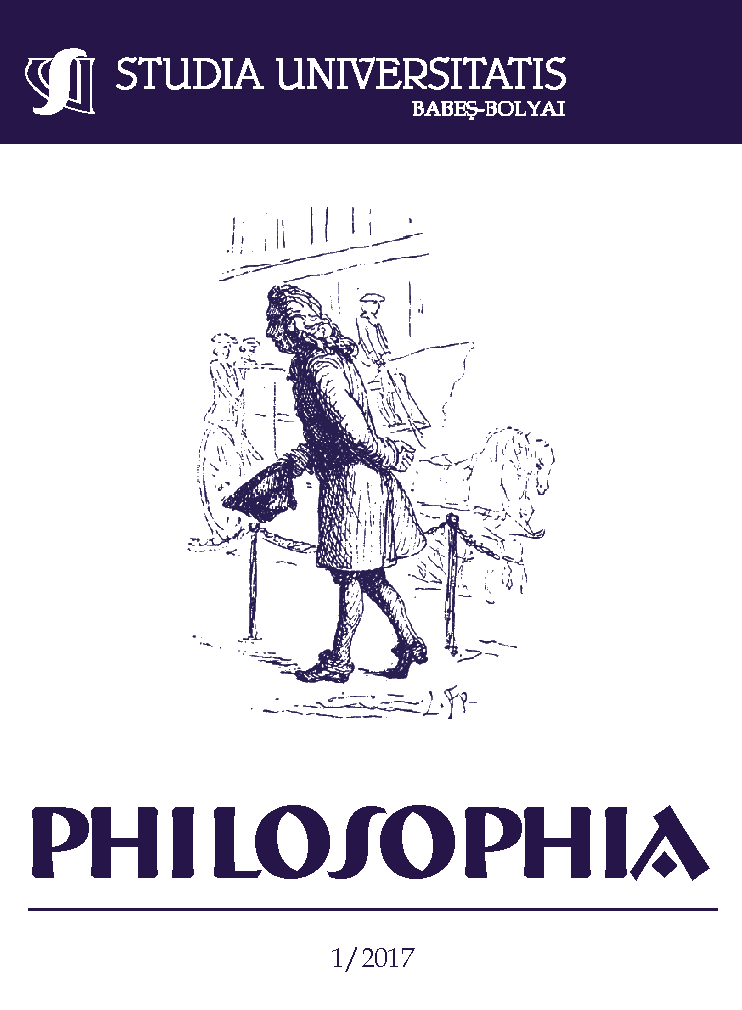“UNTIMELINESS” AND DE-(CON)STRUCTION. FOOTNOTES TO NIETZSCHE AND DERRIDA
DOI:
https://doi.org/10.24193/subbphil.2017.1.06Keywords:
untimeliness, deconstruction, critique of metaphysics, subject, identityAbstract
Although the title of the study contains even two questions, who is Zarathustra? and who is the »Who«?, it cannot be claimed that the main goal of this study is to answer them. In particularly, it cannot be claimed that these questions are answerable at all. The questions serve as leitmotif for displaying the untimely program of Nietzsche and the deconstruction of Derrida, showing analogy aspects between them, which are related to the critique of western metaphysics and its language as well as to de(con)struction of the concepts of subject and identity.
References
Adorno, Theodor W.: Negative Dialectics. Routledge, London and New York, Taylor & Francis e-Library, 2004.
Adorno, Theodor W.: Negative Dialektik. Jargon der Eigentlichkeit. In Rolf Tiedemann (Hrsg.): Gesammelte Schriften. Band 6. Suhrkamp Verlag, Frankfurt am Main, 1973.
Bacsó Béla: Utószó. Néhány megjegyzés a hermeneutikához és a dekonstruktivizmushoz. In Bacsó Béla (szerk.): Szöveg és interpretá-ció. Cserépfalvi kiadása, Budapest, 1991. 43−62.
Bennington, Geoffrey / Derrida, Jacques: Jacques Derrida. The University of Chicago Press, Chicago and London, 1993.
Deleuze, Gilles: Differenz und Wiederholung. Fink Verlag, München, 1992.
Deleuze, Gilles: Nietzsche and Philosophy. Continuum London, New York, 2002.
Derrida, Jacques: Das Ende des Buches und der Anfang der Schrift. In Peter Engelmann (Hrsg.): Jacques Derrida: Die différance. Ausgewählte Texte. Philipp Reclam jun. Stuttgart, 2008. 31−68.
Derrida, Jacques: “Différance”. Bulletin de la Sociétéfrançaise de philosophie, LXII, 1968/ 3. 278–301.
Derrida, Jacques: Dissemination. The Athlone Press, London, 1981.
Derrida, Jacques: “Eating Well,” or the Calculation of the Subject: An Interview with Jacques Derrida. In Eduardo Cadava et all (ed.): Who comes after the subject? Routledge, New York and London, 1991.
Derrida, Jacques: Ethics, Institutions, and the Right to Philosophy. Rowman and Littlefield, Oxford, 2002.
Derrida, Jacques: Excerpt from Différance. In Margins of Philosophy. University of Chicago Press, Chicago, 1982. 3−27.
Derrida, Jacques: Mémoires pour Paul de Man. Galilée, Paris, 1988.
Derrida, Jacques: Monolingualism of the Other; or, The Prosthesis of Origin. Stanford University Press, Stanford, California, 1998.
Derrida, Jacques: Negotiations. In Elizabeth Rottenberg (ed.): Negotiations: Interventions and Interviews, 1971−2001. Stanford University Press, Stanford 2002. 11−41.
Derrida, Jacques: Nietzsche and the Machine. In Elizabeth Rottenberg (ed.): Negotiations: Interventions and Interviews, 1971–2001. Stan-ford University Press, Stanford, 2002. 215−257.
Derrida, Jacques: Of Grammatology. Baltimore & London, John Hopkins University Press, 1997.
Derrida, Jacques: Of Spirit. Heidegger and the Question. University of Chicago Press. Chicago and London, 1989.
Derrida, Jacques: Politics and Friendship. In Elizabeth Rottenberg (ed.): Negotiations: Interventions and Interviews, 1971−2001. Stanford University Press, Stanford 2002. 147−199.
Derrida, Jacques: Positions. Athlone, London, 1981.
Derrida, Jacques: Randgänge der Philosophie. Hrsg. von Peter Engel-mann, Passagen Verlag, Wien, 1988.
Derrida, Jacques: Structure, Sign and Play. In: Writing and Difference. Routledge, New York and London, 2001.
Derrida, Jacques: Wie nicht sprechen. Verneinungen. (Hrsg.) Peter Engel-mann. Passagen Verlag, Wien, 1989.
Fichte, Johann Gottlieb: Grundlage der gesamten Wissenschaftslehre (1794). Felix Meiner Verlag, Hamburg, 1956.
Freud, Sigmund: Entwurf einer Psychologie. Gesammelte Werke. Nachtragsband. Fischer, Frankfurt am Main, 1895. 373−486.
Freud, Sigmund und Breuer, Josef: Studien über Hysterie. Franz Deuticke, Leipzig und Wien, 1895.
Gadamer, Hans-Georg: Truth and Method. Second, Revised Edition Translation revised by Joel Weinsheimer and Donald G. Marshall. Continuum, London, New York, 2004.
Gadamer, Hans Georg: Wahrheit und Methode. Grundzüge einer philosophischen Hermeneutik. In Gesammelte Werke Band 1. Hermeneutik I. J. C. B. Mohr (Paul Siebeck), Tübingen, 1990.
Hegel, Georg Wilhelm Friedrich: Differenz des Fichteschen und Schellingschen Systems der Philosophie (1801). In Jenaer Schriften 1801−1807 Werke 2. Suhrkamp Verlag, Frankfurt am Main, 1970.
Hegel, Georg Wilhelm Friedrich: Phänomenologie des Geistes. In Eva Moldenhauer und Karl Markus Michel (Hrsg.): Werke. Band 3. Suhrkamp, Frankfurt am Main, 1989.
Hegel, Georg Wilhelm Friedrich: Phenomenology of Mind. In: http://www.blackmask.com.
Hegel, Georg Wilhelm Friedrich: Sämtliche Werke, ed. H. Glockner, Bd. 1.
Joós Ernő: Látszat és Valóság. [Appearance and Reality.] Sylvester János Könyvtár, Sárvár, 1995.
Kimmerle, Heinz: Jacques Derrida zur Einführung. Junius Verlag, Hamburg 2000.
Kundera, Milan: The Unbearable Lightness of Being. 2. Harper Perennial Modern Classics.
Löwith, Karl: Világtörténelem és üdvtörténet [World History and Salvation History]. Atlantisz Kiadó, Budapest, 1996.
Lüdemann, Susanne: Jacques Derrida zur Einführung. Junius Verlag, Hamburg 2011.
Nietzsche, Friedrich: Also sprach Zarathustra I−IV. Band 4. In Giorgio Colli und Mazzino Montinari (Hrsg.): Sämtliche Werke. Kritische Studienausgabe in 15 Einzelbänden. Deutscher Taschenbuch Verlag, de Gruyter, München, 1999.
Nietzsche, Friedrich: Die Geburt der Tragödie, Unzeitgemäße Betrachtungen, I−IV Nachgelassene Schriften 1870−1873. Band 1. In Giorgio Colli und Mazzino Montinari (Hrsg.): Sämtliche Werke. Kritische Studienausgabe in 15 Einzelbänden. Deutscher Taschenbuch Verlag, München, Walter de Gruyter, Berlin/New York, 1988.
Nietzsche, Friedrich: Der Fall Wagner, Götzen-Dämmerung, Der Antichrist, Ecce homo, Dionysos- Dithyramben, Nietzsche contra Wagner. Band 6. In Giorgio Colli und Mazzino Montinari (Hrsg.): Sämtliche Werke. Kritische Gesamtausgabe, Deutscher Taschenbuch Verlag, Berlin, 1969.
Nietzsche, Friedrich: Human, All Too Human. A Book for free Spirits. Cambridge University Press, 1996.
Nietzsche, Friedrich: On the Use and Abuse of History for Life. Cosimo Classics, New York, 2005.
Nietzsche, Friedrich: Selected Letters of Friedrich Nietzsche. Edited by Dr. Oscar Levy. Nietzsche to Peter Gast. Sils-Maria, Monday, September 3, 1883. Library of Trinity Collage Toronto, Garden City, New York and Toronto, 1958.
Nietzsche, Friedrich: The Birth of Tragedy and Other Writings. Cambridge University Press, 2007.
Nietzsche, Friedrich: Thus Spoke Zarathustra. Cambridge University Press, New York, 2006.
Nietzsche, Friedrich: Untimely Meditations. Cambridge University Press, 2007.
Saussure, Ferdinand de: Grundfragen der Allgemeinen Sprachwissenschaft. De Gruyter, Berlin, 1967.
Simmel, Georg: Schopenhauer und Nietzsche. Ein Vortragszyklus. Verlag von Duncker & Humblot, München und Leipzig, 1907.
Sutyák, Tibor: Hogyan lesz Zarathustra azzá, aki? Gond 1994/7. 53−73. ? [How does Zarathustra become what he is?].
Tatár, György: Az öröklét gyűrűje. [The Ring of Eternity.] Gondolat Kiadó, Budapest, 1989.
Valadier, Paul: Dionüszoszt a megfeszítettel szemben. [Dionysus Face to Face with the Crucified.] Ex Symposion, 1994. Különszám. 139−145.
Wittgenstein, Ludwig: Tractatus Logico-Philosophicus. Logisch-philosophische Abhandlung. 7. http://people.umass.edu/phil335-klement-2/tlp/tlp-ebook.pdf.
Downloads
Published
How to Cite
Issue
Section
License
Copyright (c) 2017 Studia Universitatis Babeș-Bolyai Philosophia

This work is licensed under a Creative Commons Attribution-NonCommercial-NoDerivatives 4.0 International License.





